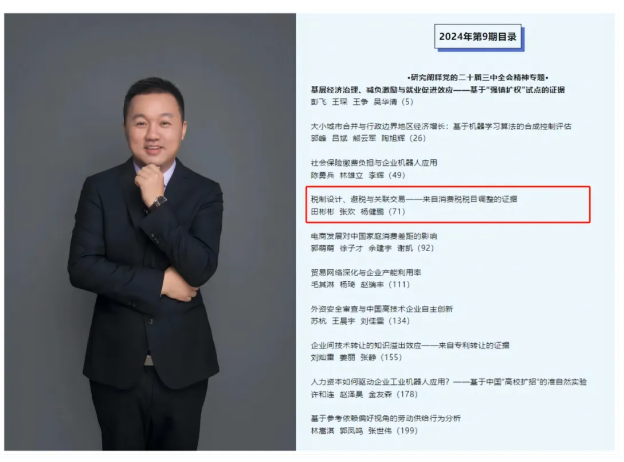
Tax System Design, Tax Avoidance and Related Party Transactions: Evidence from China
Tian Binbin, Zhang Huan, Yang Jianpeng (71)
[Academic Journal] Journal of Quantitative & Technical Economics, Issue 9, 2024.
[About the author] Tian Binbin is a Distinguished Professor of Wenlan School of Business at Zhongnan University of Economics and Law, a researcher at the Innovation and Talent Base for Income Distribution and Public Finance, a doctoral supervisor, a candidate for the National Talent Project, and Young Top-notch Talent in Hubei Province. His research interests include public finance, empirical taxation and development economics. His researches have been published in Economic Research Journal, Journal of Management World, The Journal of World Economy, China Economic Quarterly, China Economic Review and etc. He has presided over a number of provincial and ministerial projects such as the General Program and Youth Program of the National Natural Science Foundation of China, and the Humanities and Social Sciences Fund Project of the Ministry of Education. He has won many honors such as the First Prize of Social Science Outstanding Achievement Award in Hubei, the First Prize of Outstanding Achievements in Tax Research of the Chinese Tax Institute, and the Best Paper Award at Camphor Finance Conference. He is also a director of Young and Middle-aged Tax Research Association of the Chinese Tax Institute.
[Main Opinion] Tax avoidance motivation is a significant factor behind intercompany transactions, but establishing a direct relationship between the two remains a challenging area in existing research. China's consumption tax adopts a single-stage taxation model at the production level, and transfer pricing through related-party transactions is the only method of tax avoidance under this model. This paper examines the tax avoidance motivation behind related-party transactions of Chinese listed companies by leveraging the exogenous impact of the 2015 consumption tax adjustment. The results show that, compared to non-taxable companies under the consumption tax, firms subject to the consumption tax significantly increased the scale of outbound related-party transactions involving goods after becoming taxable. However, there was no impact on inbound transactions involving goods or on non-goods-related transactions, aligning with the characteristics of the consumption tax being levied at the production stage. In addition, the study found that related-party transactions were primarily concentrated between parent and subsidiary companies, which also aligns with the logic of profit shifting within corporate groups. Finally, the study reveals significant heterogeneity in its conclusions across various dimensions, such as tax audit information, internal governance quality, and external regulatory capacity. This study provides important insights for the ongoing consumption tax system reform and broader tax reforms in China.
